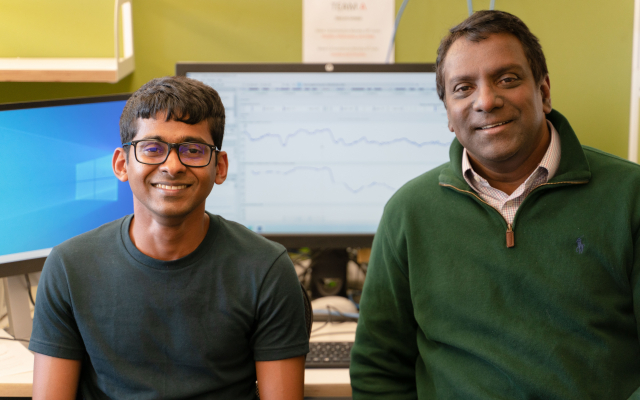
UNSW Higher Degree Research (HDR) candidate Hasindu Gamaarachchi is exploring ways to make genomic testing easier using computer science.
Hasindu Gamaarachchi is passionate about computer science and engineering. He is now three years into his PhD combining his enthusiasm for biology and computer engineering. 
“My thesis project is multidisciplinary, combining biological DNA analysis and hardcore computer engineering,” Hasindu said. “The goal is to design a specialised computer system for processing large amounts of DNA data. It has the potential to be a real game changer in healthcare.”
Hasindu’s research focuses on ‘miniaturising’ so large amounts of data can be processed on portable computing devices such as laptops or mobile phones instead of large supercomputers. His work has applications in precision medicine and epidemiology.
“DNA sequencing is a rapidly developing field,” Hasindu said. “It’s used to analyse and track transmission of the novel human coronavirus for example, and inform things like cancer detection and post-treatment surveillance. However, testing isn’t always accessible. It relies heavily on centralised supercomputers. I’m working with a team of researchers at the Garvan Institute of Medical Research to help change that.”
Sharing research on the global stage
Hasindu’s research won third place in the 2020 Association for Computing Machinery (ACM) Student Research Competition in June, ahead of 356 computer science students from around the world. It’s the first time a PhD candidate from an Australian university has become a grand finalist in the graduate category in the 17-year competition history.
“I’m enormously grateful for the support of my supervisor at UNSW, Professor Sri Parameswaran,” Hasindu said. “Without him the opportunity to collaborate with the Garvan Institute wouldn’t have been possible. It was the turning point of my career. My co-supervisor Matin A. Smith from Garvan has also played a pivotal role, ultimately helping me get to where I am today.”
From undergraduate to Higher Degree Research candidate
Hasindu graduated from the University of Peradeniya in Sri Lanka in 2015, with first class honours for Computer Engineering. During his undergraduate degree he realised his passion for research and discovering new things. His mentors at the University of Peradeniya completed research in Computer Science and Engineering (CSE) at UNSW and encouraged him to undertake his own research project at the University.
“My curiosity and passion to try new things was what drove me to do research,” Hasindu said. “I easily get bored with routine work, but research is always about something new – it’s incredibly dynamic.
“I chose UNSW mainly due to the positive recommendations from UNSW’s Computer Science and Engineering alumni about the embedded systems research group and the reputation of Professor Parameswaran. Sydney's climate – no sub-zero temperatures! – and UNSW's campus location were an added plus.”
